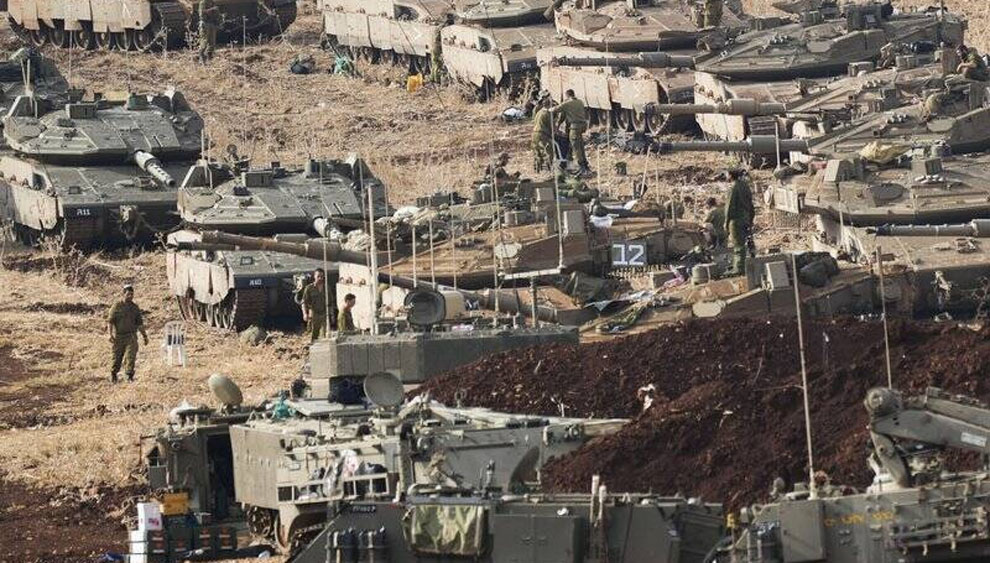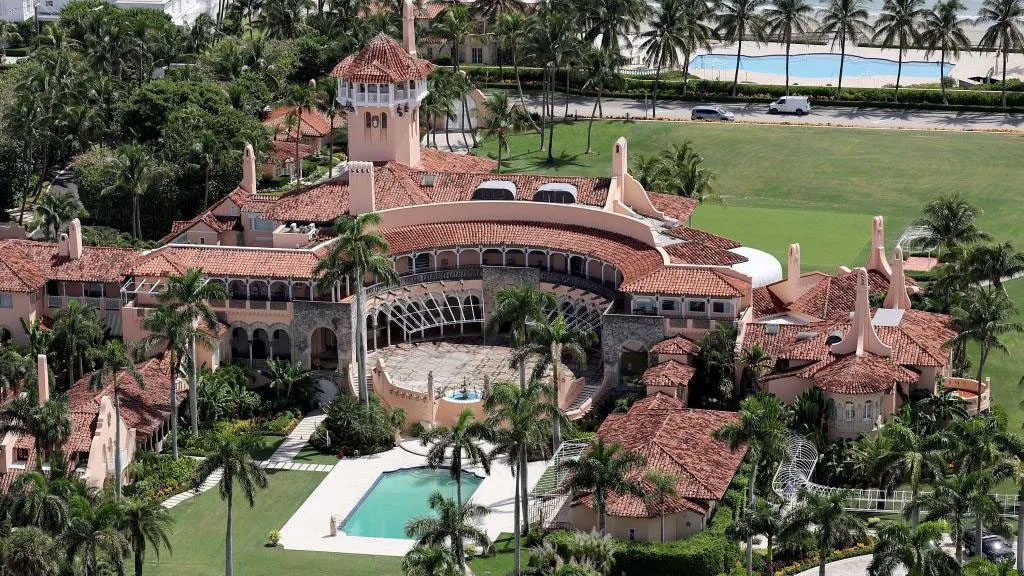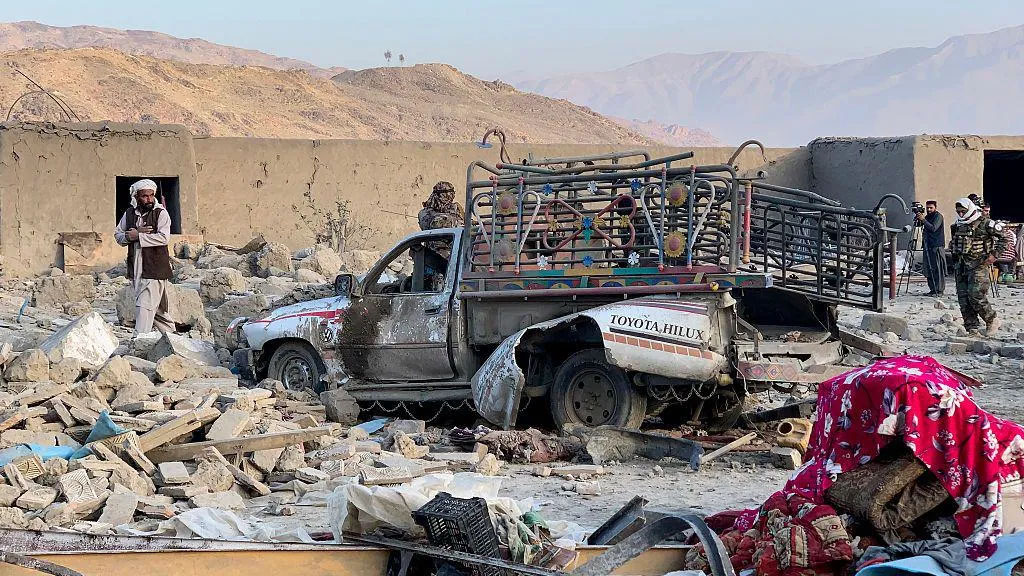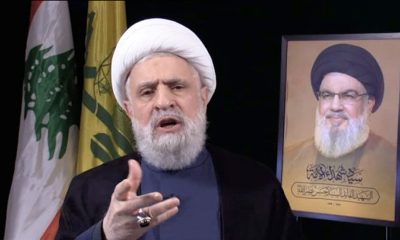International
Israeli military begins ground invasion of southern Lebanon

Israeli military begins ground invasion of southern Lebanon
BEIRUT/RIYADH: The Israeli military said early Tuesday that it had started a ground invasion of Lebanon in a long anticipated operation that leaders say will support the return of displaced Israelis to northern settlements.
Israel’s military said the operation in southern Lebanon was limited and localized and was based on precise intelligence against the Lebanese group Hezbollah, adding that the air force and artillery units were supporting ground troops.
The military said that its targets were in villages close to its border with Lebanon that pose “an immediate threat to Israeli communities in northern Israel.”
Hezbollah and Israel have been trading fire across the border for months, forcing many residents either side of it to flee or be evacuated from danger zones.
Lebanese residents in Aita al-Shaab reported heavy shelling and the sound of military aerial activity.
Lebanese authorities said that 95 people had been killed on Monday due to Israeli actions across the country.
Hezbollah said on Monday that it had carried out attacks against the Israeli military.
The Lebanese capital was again targeted by Israeli fire on Monday night as at least six strikes hit south Beirut. Residents received messages to evacuate target sites and many continue to sleep outside for safety or because they have nowhere else to go.
In Sidon, a strike targeted Mounir Maqdah, commander of the Lebanese branch of the Palestinian Fatah movement’s military wing, the Al-Aqsa Martyrs Brigade, Reuters reported citing two Palestinian security officials, and his fate was unknown early Tuesday.
The strike hit a building in the Ain Al-Hilweh Palestinian refugee camp in the south of the city.
READ ALSO:
- Gunmen abduct pastor, engineer in Kwara state
- FG increases monthly pension of retirees by N32,000
- Just in: Police attack Independence Day protesters in Abuja
In neighboring Syria, state media said that three people had been killed, including a journalist, with air defenses intercepting “hostile” targets in the Damascus area on Tuesday.
“Our air defense systems are intercepting hostile targets in the Damascus area,” Syria’s official SANA news agency said, using a phrase usually used to refer to Israeli strikes.
Earlier, State Department spokesman Matthew Miller said Israel informed the US about the raids, which he said were described as “limited operations focused on Hezbollah infrastructure near the border.”
Before the Israeli ground troops entered Lebanon, a Western diplomat in Cairo whose country is directly involved in de-escalation efforts said Israel had shared its plans with the US and other Western allies, and conveyed the operation will “be limited.”
Meanwhile, Lebanon’s army is repositioning troops stationed on its southern border, a Lebanese military official told AFP.
The Lebanese army is “repositioning and regrouping forces” at the southern border following threats of an Israeli incursion, the official said, requesting anonymity to discuss sensitive matters.
Britain and Canada announced on Monday plans to get their citizens out of Lebanon amid fears over a wider escalation that may involve Iranian intervention to support Hezbollah.
Earlier on Monday, Hezbollah’s deputy leader Naim Qassem said in his first public speech since Israeli airstrikes killed its veteran chief Hassan Nasrallah last week that the group’s fighters are primed to confront any Israeli ground invasion of Lebanon. Israel will not achieve its goals, he said.
“We will face any possibility and we are ready if the Israelis decide to enter by land and the resistance forces are ready for a ground engagement,” he said in an address from an undisclosed location.
He was speaking as Israeli airstrikes on targets in Beirut and elsewhere in Lebanon continued, extending a two-week long wave of attacks that has eliminated several Hezbollah commanders but also killed about 1,000 Lebanese and forced one million to flee their homes, according to the Lebanese government.
Nasrallah’s killing, along with the series of blows against the organization’s communications devices and assassination of other senior commanders, constitute the biggest blow to the organization since Iran created it in 1982 to fight Israel.
He had built it up into Lebanon’s most powerful military and political force, with wide sway across the Middle East.
READ ALSO:
- US ports shut down as dockworkers embark on strike
- Atiku seeks National Assembly support for six-year term president
- Tinubu confused about economic policies – Segun Sowunmi
Now Hezbollah faces the challenge of replacing a charismatic, towering leader who was a hero to millions of supporters because he stood up to Israel even though the West branded him a terrorist mastermind.
“We will choose a secretary-general for the party at the earliest opportunity…and we will fill the leadership and positions on a permanent basis,” Qassem said.
Qassem said Hezbollah’s fighters had continued to fire rockets as deep as 150 km (93 miles) into Israeli territory and were ready to face any possible Israeli ground incursion.
“What we are doing is the bare minimum…We know that the battle may be long,” he said. “We will win as we won in the liberation of 2006 in the face of the Israeli enemy,” he added, referring to the last big conflict between the two foes.
Israel, which has also assassinated leaders of the Palestinian militant group Hamas in the Gaza war, says it will do whatever it takes to return its citizens to evacuated communities on its northern border safely.
“The elimination of Nasrallah is an important step, but it is not the final one. In order to ensure the return of Israel’s northern communities, we will employ all of our capabilities, and this includes you,” Israeli Defense Minister Yoav Gallant told troops deployed to the country’s northern border.
Hours before Hezbollah’s Qassem spoke, Hamas said an Israeli airstrike killed its leader in Lebanon, Fateh Sherif Abu el-Amin, along with his wife, son and daughter in the southern city of Tyre on Monday.
Another faction, the Popular Front for the Liberation of Palestine, said three of its leaders died in a strike in Beirut’s Kola district — the first such hit inside the city limits.
The wave of Israeli attacks on militant targets in Lebanon are part of a conflict also stretching from the Palestinian territories of Gaza and the occupied West Bank, to Yemen, Iraq and within Israel itself. The escalation has raised fears that the United States and Iran will be sucked into the conflict.
The latest actions indicated Israel has no intention of slowing down its offensive even after eliminating Nasrallah, who was Iran’s most powerful ally in its “Axis of Resistance” against Israeli and US influence in the region.
Iranian Foreign Ministry spokesperson Nasser Kanaani said Tehran would not let any of Israel’s “criminal acts” go unanswered. He was referring to the killing of Nasrallah and an Iranian Guard deputy commander, Brig. Gen. Abbas Nilforoushan, who died in the same strikes on Friday.
Russia said Nasrallah’s death had led to a serious destabilization in the broader region.
A spokesperson for British Prime Minister Keir Starmer said Britain called for a ceasefire, although they added that its support for Israel’s right to self-defense was “ironclad.”
Close ally the US has shown unwavering support for Israel despite concerns over heavy civilian casualties.
Israeli military begins ground invasion of southern Lebanon
ARAB NEWS
International
US Adds 19 More Nigerians to ‘Worst of the Worst’ Deportation List

US Adds 19 More Nigerians to ‘Worst of the Worst’ Deportation List
The United States government has added 19 more Nigerian nationals to its “worst of the worst” criminal aliens list, bringing the total number of Nigerians scheduled for deportation to 113. The move targets convicted criminals who have served time in U.S. courts and are deemed a threat to public safety.
According to the U.S. Department of Homeland Security (DHS), the newly listed Nigerians were convicted of serious crimes, including sexual assault on a minor, fraud, assault, drug trafficking, and money laundering. These individuals were arrested by U.S. Immigration and Customs Enforcement (ICE) and will be deported after completing immigration procedures.
A DHS statement highlighted the purpose of the programme:
“The U.S. Department of Homeland Security is highlighting the worst of the worst criminal aliens arrested by U.S. Immigration and Customs Enforcement. Under Secretary Kristi Noem’s leadership, ICE is carrying out deportations — starting with the worst of the worst.”
READ ALSO:
- Gunmen Storm Gbugbu in Kwara, Residents Flee as Panic Spreads
- FG to Launch Monthly Revenue Transparency Dashboards to Improve Fiscal Accountability
- Troops Repel Coordinated Attacks in Borno, Kill 25 Terrorists, Soldier Dies
Among those newly added to the list are Adeolu Solabu, Oladayo Agboola, Chinonso Ochie, Oluchi Jennifer Chimdimma Chime, Samuel Omorodion, Sunday Adediora, Sunday Kunkushi, Mkpouto Etukudoh, as well as Marcus Unigwe, Kehinde James, Blessing Uchanma, Victor Adebisi, Richard Ugbah, Olaniyi Ojikutu, Oluwamuyiwa Olawoye, Okechukwu Amadi, Femi Jolayemi, Anthony Asanya, Izuchukwu Okoye, and Ebele Agbasiele.
This latest addition follows a previous announcement in which 79 Nigerian nationals had already been slated for deportation for offences ranging from fraud, manslaughter, assault, robbery, to drug-related crimes. The combined total of 113 Nigerians reflects the U.S. government’s intensified focus on criminal aliens.
The move has sparked renewed discussion about U.S. immigration enforcement, diplomatic engagement with Nigeria, and the rights and welfare of deportees. Advocates have raised concerns about ensuring due process and humane treatment for those returned to Nigeria, while authorities stress that deportation is a legal measure targeting foreign nationals convicted of serious crimes.
Globally, Nigerians have faced similar deportation measures, including large-scale removals from countries like India, where thousands were repatriated for visa violations or alleged criminal activities. The ongoing deportations underscore the challenges facing Nigerian citizens abroad amid tightened international immigration and law enforcement policies.
US Adds 19 More Nigerians to ‘Worst of the Worst’ Deportation List
International
Armed Man Shot Dead at Trump’s Mar‑a‑Lago Residence by Secret Service

Armed Man Shot Dead at Trump’s Mar‑a‑Lago Residence by Secret Service
An armed man was shot and killed early Sunday after breaching the secure perimeter of Donald Trump’s Mar‑a‑Lago residence in Palm Beach, Florida, the United States Secret Service confirmed. The incident occurred around 1:30 a.m. ET (06:30 GMT) while Trump and First Lady Melania Trump were in Washington, D.C.
Authorities said the suspect, later identified as Austin Tucker Martin, a 21-year-old from Cameron, North Carolina, was carrying a shotgun and a fuel canister when confronted by Secret Service agents and a Palm Beach County sheriff’s deputy. Officers ordered him to drop the items, but he raised the shotgun toward them, prompting them to fire and neutralise the threat. No law enforcement officers were injured in the incident. Martin’s family had reported him missing hours before the shooting. Moore County authorities said the missing-person report was turned over to federal investigators. Officials are examining whether he acquired the firearm during his drive from North Carolina to Florida. A box for the shotgun was later recovered from his vehicle.
READ ALSO:
- Women, Children Killed as Pakistan Launches Overnight Strikes on Afghanistan
- 2027 Elections: IPOB Vows to Resist APC Godfatherism in Abia
- FG Arraigns Abuja Pastor-Doctor Over Alleged ₦19m Fraud, Sale of Embryos
Palm Beach County Sheriff Ric Bradshaw described the encounter: the suspect dropped the fuel can but lifted the shotgun into a threatening position. “At that point, agents fired their weapons to neutralise the threat,” Bradshaw said. Officers involved were equipped with body cameras, which captured the incident. The FBI is leading the investigation with support from the Secret Service and local law enforcement. Officials are analyzing bodycam footage, gathering evidence, and creating a psychological profile of the suspect. Authorities have yet to determine a motive.
Mar‑a‑Lago is heavily guarded, with an outer cordon maintained by local Palm Beach deputies and an inner perimeter secured by the Secret Service. Visitors are screened, and vehicles and bags are checked with metal detectors and sniffer dogs. The shooting adds to a history of threats against Trump. In July 2024, Trump was grazed by a bullet at a rally in Butler, Pennsylvania, where one bystander was killed and two others injured. Another would-be assassin, Ryan Routh, attempted an attack at Trump International Golf Club in West Palm Beach and was recently sentenced to life in prison. Following the Mar‑a‑Lago shooting, Secret Service Director Sean Curran traveled to Florida to oversee “after-actions” and reinforce operational communication and response protocols.
Political violence has become a prominent topic in the US. Treasury Secretary Scott Bessent criticized what he described as “normalizing violence” in politics, referencing previous assassination attempts and recent high-profile attacks, including the public shooting of right-wing activist Charlie Kirk and the fatal shootings of a Democratic lawmaker and her husband in Minnesota. The FBI and Secret Service are continuing the investigation to determine the suspect’s motive and possible affiliations, with authorities pledging to release updates as more information becomes available.
Armed Man Shot Dead at Trump’s Mar‑a‑Lago Residence by Secret Service
International
Women, Children Killed as Pakistan Launches Overnight Strikes on Afghanistan

Women, Children Killed as Pakistan Launches Overnight Strikes on Afghanistan
Pakistan has carried out deadly overnight airstrikes on Afghanistan, killing at least 18 people, including women and children, according to the Afghan Taliban, in a major escalation of Pakistan–Afghanistan tensions along their volatile border.
Islamabad confirmed that the operation involved precision airstrikes against seven alleged militant camps and hideouts close to the Pakistan–Afghanistan border, saying the attacks were launched in retaliation for recent suicide bombings inside Pakistan. Pakistani officials said the strikes were intelligence-based and aimed at eliminating armed groups accused of orchestrating cross-border attacks.
The Taliban government in Afghanistan strongly condemned the strikes, accusing Pakistan of bombing civilian homes and a religious school. Afghan authorities described the attacks as a violation of national sovereignty and warned that continued military action could worsen regional instability.
According to Afghanistan’s defence ministry, the airstrikes hit civilian areas in Nangarhar and Paktika provinces. In Girdi Kas village in the Bihsud district of Nangarhar, residents said entire families were affected when homes were destroyed. Local Taliban officials said 18 members of one family were killed, while only a few survived. Earlier casualty estimates had placed the death toll at around 20 people, though figures were later revised.
READ ALSO:
- 2027 Elections: IPOB Vows to Resist APC Godfatherism in Abia
- FG Arraigns Abuja Pastor-Doctor Over Alleged ₦19m Fraud, Sale of Embryos
- Tinubu Hails Wike as APC Dominates 2026 FCT Area Council Elections
In Paktika province, strikes reportedly hit a guesthouse and a religious school in the Bermal and Urgun districts. Local officials said those facilities were empty at the time, and no deaths were reported there.
Pakistan’s Ministry of Information and Broadcasting said the military action involved “selective targeting” of fighters linked to the banned Tehreek-i-Taliban Pakistan (TTP), which Islamabad refers to as Fitna al Khawarij, as well as elements of the Islamic State-Khorasan Province. The ministry described the operation as a retributive response to terror attacks it said were planned from Afghan soil.
The latest escalation follows a series of deadly attacks in Pakistan, including a suicide bombing at a Shia mosque in Islamabad earlier this month and additional assaults in Khyber Pakhtunkhwa since the start of Ramadan. Pakistan accused the Afghan Taliban of failing to rein in militants, claiming it had conclusive evidence that some of the attacks were directed from across the border. Kabul has repeatedly denied allowing Afghan territory to be used against neighbouring countries.
In a strongly worded response, the Taliban’s defence ministry described the airstrikes as a “blatant violation of Afghanistan’s territorial integrity” and a “clear breach of international law.” It warned that an “appropriate and measured response” would be taken at a suitable time, accusing Pakistan of flawed intelligence for hitting civilian targets and religious institutions.
The strikes come despite a fragile ceasefire reached in October after deadly cross-border clashes, the worst since the Taliban returned to power in 2021. Although that truce reduced large-scale fighting, sporadic clashes and air operations have continued to strain relations.
Tensions had briefly eased earlier this week after Saudi Arabia mediated the release of three Pakistani soldiers captured during last year’s border clashes. However, analysts warn that the latest airstrikes could undermine diplomatic efforts, worsen humanitarian conditions in border communities, and heighten the risk of further retaliation.
Pakistan and Afghanistan share a 1,600-mile mountainous border, long plagued by militancy, smuggling, and recurring military confrontations, making it one of the region’s most unstable frontiers.
Women, Children Killed as Pakistan Launches Overnight Strikes on Afghanistan
-

 Business1 day ago
Business1 day agoDangote Opens Refinery Investment to Nigerians With Public Share Sale Plans
-

 Politics3 days ago
Politics3 days agoPeter Obi Launches ‘Village Boys Movement’ to Rival Tinubu’s City Boys Ahead of 2027
-

 Education2 days ago
Education2 days agoUTME: JAMB Clarifies Position on Hijab During Biometric Capture
-

 Politics18 hours ago
Politics18 hours agoTinubu Hails Wike as APC Dominates 2026 FCT Area Council Elections
-

 Education3 days ago
Education3 days agoOgun Gov Rewards Nigeria’s Best Primary School Teacher with Car, Bungalow
-

 Politics2 days ago
Politics2 days agoADC Defeats APC to Win First Polling Unit in FCT Area Council Election
-

 Entertainment3 days ago
Entertainment3 days agoTacha Condemns False Rape Allegations After Mirabel Admits Fabrication
-

 Politics1 day ago
Politics1 day agoOpposition Weakens as Another Governor Eyes APC Move















